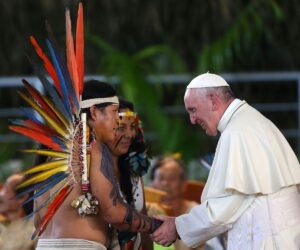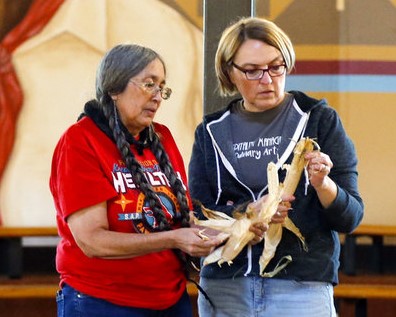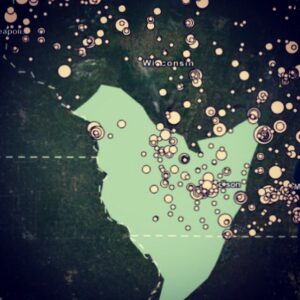“It is essential to show special care for Indigenous communities and their cultural traditions. They are not merely one minority among others, but should be the principal dialogue partners, especially when large projects affecting their land are proposed.”
– Pope Francis, Laudato Si
 Our Saint Kateri Indigenous Peoples Program connects Catholics and Catholic land stewards with the Indigenous Peoples who lived on the land for thousands of years.
Our Saint Kateri Indigenous Peoples Program connects Catholics and Catholic land stewards with the Indigenous Peoples who lived on the land for thousands of years.
We believe that it is important to serve as allies with our Indigenous sisters and brothers to foster right relationships with each other and our Creator, and to promote social justice and a truly integral ecology.
Since our founding, we have encouraged social justice for Indigenous Peoples, particularly as this relates to Traditional and Western ecology.
Our patron saint, Kateri Tekakwitha, was an Indigenous woman born in 1656 in what is now upstate New York. Kateri’s mother was Catholic and a member of the Algonquin tribe, and her father was a Kanienkehaka (Mohawk) Chief. Kateri is recognized for her heroic virtue and the action of grace in her life. Kateri has a deep knowledge of the plants, animals, fields, forests, wetlands, and waterways of her homeland before they would be degraded or destroyed.
Indigenous cultures and traditions develop in the places where Indigenous Peoples have lived for many centuries. As a result, Indigenous Peoples have a Traditional Ecological Knowledge (TEK), which is a specialized knowledge of their environment acquired over thousands of years of direct contact with nature. TEK is learned and practiced from experience and passed down orally from generation to generation.
Conservationists today are increasingly looking to TEK to guide us on the best ways to manage our land and its wildlife. For example, conservationists use prescribed fire to manage ecosystems much as Indigenous Peoples have done for millennia.

In 2019, we expanded our Indigenous Peoples Program with the addition of Ronnie O’Brien to our volunteer staff. Ronnie brings nearly 20 years of experience in working with Native American tribes, especially the Pawnee Nation, returning traditional crops to their homelands.
Our Indigenous Peoples Program connects individual Catholics, Catholic institutions, religious orders, and other Catholic land stewards with the Indigenous People who once inhabited the land and may have been forced to move elsewhere.
The program helps Indigenous Peoples to cultivate, harvest, and collect their traditional varieties of corn, squash, beans, and other crops and medicinal plants on their original homelands. They are able to once again participate in the traditions, stories, and ceremonies surrounding their sacred crops and medicines.
Indigenous adults and youth are supported to travel to their homelands to experience first-hand the cultivation and gathering of sacred plants. Opportunities for subsistence hunting and fishing may also be considered. The resulting healthy foods and traditional medicines are then returned to the people in their present-day homes and nations.

We collaborate with all Indigenous Peoples, whether they are Catholic, other Christian, Traditional, or other Indigenous spirituality or tradition.
We also work with Catholic landowners and Indigenous Peoples of the Americas and their descendants in their new homes within the USA, wherever they may be.
Please contact us at saintkatericenter@gmail.com if you would like to connect with us and the Indigenous Nations where you live. Our program is supported by the generous donations of people like you.
